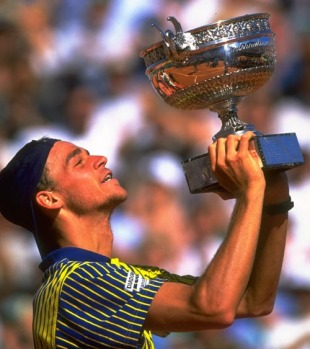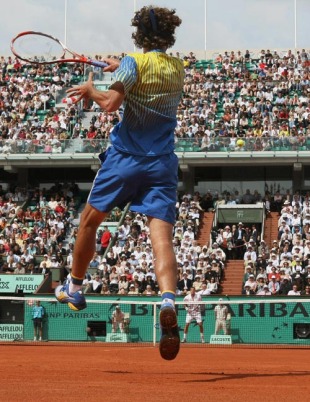
Football may command the clichéd moniker of 'the beautiful game', but every so often tennis throws up a player who paints a picture every bit as intricate as Ronaldinho, manipulates a ball with just as much precision as David Beckham, and provides titivation for the eyes of which Wayne Rooney can only dream.
Gustavo Kuerten, or "Guga" as he became affectionately known, was a true artist on a tennis court, where the racket acted as his paintbrush. Brazilian by birth and crowned with flamboyant, almost afro-like hair to reflect his personality, he believed in spin and craft over power, boasting a game that captured the hearts of his adopted second home: Paris, where his legacy was formed.
Nowadays, whenever the tennis calendar takes its annual flick deep into the month of May, the name of Rafael Nadal is on the lips of all tennis fans. But back at the turn of the Millennium, it was the relentless smile and the unplayable backhand of Kuerten that lit up the clay courts of Roland Garros.
The backhand was the Kuerten trademark. He was strong off either wing and boasted a more-than-competitive serve, but his arcing whip of a backhand - as dismissive as it was graceful - was the weapon by which he carved out three French Open title triumphs.
The first came as a mere 20-year-old upstart, unknown to most of the tennis world, which instantly became dazzled by his bright yellow shirt and trademark grunt. The year was 1997, one of the best in the career of Pete Sampras, who won the Australian Open and Wimbledon either side of his failure in France.
Inevitably, Marcelo Rios and Alex Corretja were widely tipped to rule the clay, having both reached the final of the two lead-up tournaments in Monte Carlo and Rome. Then there was the defending champion, Yevgeny Kafelnifov, whose quarter-final loss to Kuerten rocketed the Brazilian towards stardom.
The style was everything when it came to Kuerten. Standing way behind the baseline, he loved nothing more than to whip and chop away at the ball, kicking it off the clay to force his opponents to play their shots at awkward, unorthodox heights. Kafelnikov battled into a 2-1 lead in their quarter-final meeting, but his power game grew increasingly tired in the face of long rallies with Kuerten. Guga took advantage, dethroning the champion in a fantastic five-setter.
Combining grace and precision with a determination that made every point a Championship decider, Kuerten defied his world No. 66 ranking to progress to the final. There, having never won a pro tournament before, he defeated the then two-time Roland Garros winner Sergi Bruguera 6-3 6-4 6-2.
The final summed Kuerten up. Given a defensive wall of an opponent in Bruguera, he turned on the style to hit winners from all angles, simultaneously becoming the lowest-ranked winner of a Grand Slam since 1976 - the year of his birth. A mutual love affair with Paris had begun, and by the time he won his third French Open in 2001, Kuerten fittingly used his racket as a paintbrush on the blank canvas of the clay, drawing a heart to signal his affection for the crowd.

Kuerten's affinity with Roland Garros was never summed up better than during the act of retirement which, suitably, came in Paris. Having played for the last time in 2008 following an unsuccessful return from a hip operation, he received a piece of the court from Roland Garros officials before declaring: "This particular tournament is really like home for me."
At 31 years of age, the body had given up on the former three-time champion, but true to form he remained smiling despite defeat to Paul-Henri Mathieu, a man he would have breezed past in his prime. Still concerned with style over substance, Kuerten revealed why defeat had left him happy.
"I surpassed my expectations in all aspects, always with the same pleasure on the court. I thought I played much better than I expected, and there wasn't a single shot I didn't make.
"I played forehands, backhands, serves, drop shots, volleys. I did everything I think I was able to do in the past, just not with the same frequency. But at least I had the feeling to do it once more."
Come Saturday at the 2010 French Open, Kuerten will be back. Joining forces with the darling of Roland Garros, Mary Pierce, the Brazilian will take part in a doubles match against the winners of the Junior Challenge, which sees some of the world's best 12-year-olds take part in a doubles tournament battling for the right to share the same court as their heroes.
Giving back to tennis is now where the 33-year-old channels his efforts. Sprinkled between sessions on the surf of Praia Brava in Brazil, Kuerten shares his wealth of knowledge with the local talents, playing and coaching them to find Brazil's next tennis icon.
This weekend the spotlight, only briefly, will be back on the man himself. And having seen the enjoyment Kuerten always drew from playing at Roland Garros, Saturday will arguably be a greater joy for the Brazilian than for the starry-eyed juniors standing across the net.

